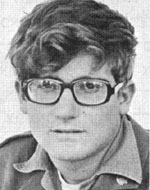Son of Refael and Devorah. He was born on the 27th of Kislev 5714 (27.11.1953) in the Beerot Yitzhak group, when he was two years old, when the parents left the farm and spent two years in the Yemin Orde educational institution, and then moved to a permanent yeshiva in Kiryat Shmuel, Haifa Oded attended the state religious school in Tel Aviv and was a diligent, quiet and disciplined student who, in the opinion of his teachers, was too quiet, and showed interest in nature, flora and fauna, and participated in all the trips and summer camps of Bnei Akiva. Surrounded the land, and Oded devoted himself entirely to the care of the garden and the cultivation of flowers, and over the years this occupation became a hobby and aroused the aspiration to become a farmer when the day came, but he did not give up high school and finished with After the Six-Day War, Oded traveled extensively throughout the country, especially in the Golan Heights, where he was satisfied with his love of nature. The company looked for nature in its own way, encouraging close contact with the secular environment, but not assimilating it, fulfilling the commandments faithfully – out of inner desire and not because of social coercion – was a symbol of simplicity, humility and contentment. Amazing. These qualities, as well as the observance of the commandments, were maintained in all situations, even under conditions of pressure in the army and on the battlefield. On the brink of his enlistment in the IDF in February 1972, Oded decided to volunteer for the Sayeret Shaked Brigade, but when the unit was canceled, he volunteered for the Golani Brigade, completed his basic training as an outstanding platoon leader. He was a strict guide and found tracks to his students. However, he did not find satisfaction in this work and asked to be absorbed into a combat unit. Shortly before the Yom Kippur War he arrived at the First Bounty Regiment. In his ranks he participated in the battle of containment, breaking through the purple line, conquering the enclave, and the conquest of Mount Hermon, which was known to be one of the fiercest battles in the war. He was wounded in the head and hospitalized in Safed. Even before the wound healed, Oded insisted on returning to his unit to rejoin the life of the battalion. “Oded returned to Mount Hermon in the winter for the period of employment and was appointed as a platoon sergeant, because Oded distinguished himself from all the platoon commanders in his adult life, the degree of responsibility, the willingness and dedication he displayed to each and every one of his responsibilities, , Both as a combatant and as a commander. Therefore, he was sometimes assigned duties, imposed on officers only. One of these functions is to watch during the bombardment to locate enemy sources of fire and try to hit them with the fire of our forces – a task that is imposed on officers only. Because of his risk, because of the courage he requires and because of his responsibility. And when the platoon commander was on the same day on an observation tour somewhere else, the job was assigned to Oded, knowing that it would be all right. ” His comrades, brothers in arms, testified: “In the eyes of all the soldiers, he symbolized the seriousness, the responsibility, when he had to carry out work, he was always the first to do it, and then the other soldiers joined in. Or he would have cleared the opening of the incessant snow, or he would have cleaned the weapon and the position.In the War of Attrition, in that narrow bunker and in the most crowded living conditions, he managed to organize the place and make it neat and clean. ” Shortly before the end of the Yom Kippur War, he continued to fulfill the difficult and dangerous role of holding the Tel-El-Male position on the Golan Heights. On Tuesday, May 24, 1974, Oded fell in battle and was brought to eternal rest in the military cemetery in Haifa, leaving behind his parents, brother and sister.After his death, he was promoted to the rank of St.-Sgt. The family commemorated a Torah scroll in the Bnei Akiva synagogue in Kiryat Shmuel, and also published a memorial album that contains, in addition to appreciation and pictures, Torah and thought.
